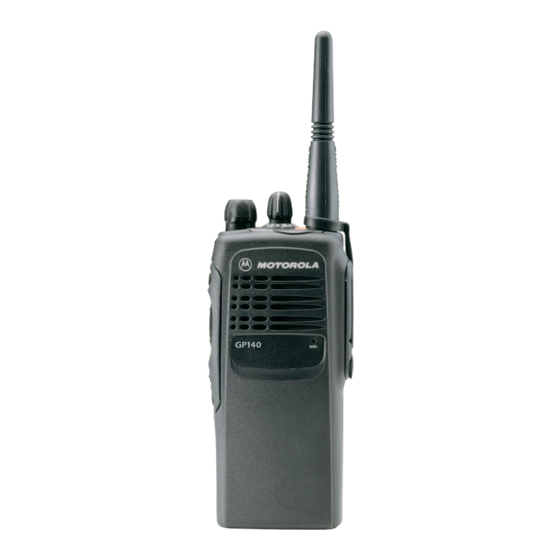Motorola GP140 Series User Manual - Page 14
Browse online or download pdf User Manual for Two-Way Radio Motorola GP140 Series. Motorola GP140 Series 20 pages. Professional radio, power distribution and controller
Also for Motorola GP140 Series: Service Information (32 pages), Service Information (30 pages), Basic Service Manual (46 pages), Service Information (30 pages)

BATTERY INFORMATION
Battery Care and Tips
This product is powered by a nickel-cadmium (Ni-Cd),
nickel-metal-hydride (NiMH), or lithium-ion
rechargeable battery.
The following battery tips will help you obtain the
highest performance and longest cycle life from your
Motorola rechargeable battery.
•
Charge your new battery overnight (14-16 hrs)
before using it to obtain maximum battery
capacity and performance.
•
Charging in non-Motorola equipment may lead
to battery damage and void the battery warranty.
•
When charging a battery that is attached to the
radio, turn the radio off to ensure a full charge.
•
The battery should be at about 25°C/77°F (room
temperature) whenever possible. Charging a
cold battery (below 10°C/50° F) may result in
leakage of electrolyte and ultimately, in failure of
the battery.
English
12
•
Charging a hot battery (above 35°C/95°F)
results in reduced discharge capacity, affecting
the performance of the radio. Motorola rapid-rate
battery chargers contain a temperature-sensing
circuit to ensure that the battery is charged
within these temperature limits.
•
New batteries can be stored up to two years
without significant cycle loss. Store new/unused
batteries, at room temperature, in cool dry area.
•
Batteries which have been in storage should be
charged overnight.
•
Do not return fully charged batteries to the
charger for an "extra boost". This action will
significantly reduce battery life.
•
Do not leave your radio and battery in the
charger when not charging. Continuous charging
will shorten battery life. (Do not use your charger
as a radio stand.)
•
For optimum battery life and operation use only
Motorola brand chargers. They were designed to
operate as an integrated energy system.
